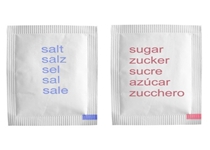 In this article, I’m going to dive into how too much sugar and too little salt could have a negative impact on your blood pressure.
In this article, I’m going to dive into how too much sugar and too little salt could have a negative impact on your blood pressure.
Salt and Sugar Staples in Every American Pantry
Your pantry can be seen as a kind of medicine cabinet in your kitchen. Every ingredient contained behind its doors is a contributing factor to your health and wellness. Like any medicine, food can heal, but it also has the potential to cause adverse reactions.
The other day, I was over at my friend’s house, helping them cook dinner, and I walked into the pantry to find some spices. Situated on the top shelf, I saw a saltshaker next to a large container of sugar, and I began to wonder—what white crystal is worse for your heart?
You see, science has scrutinized salt for years. Medical researchers have claimed salt and sodium consumption causes high blood pressure, also known as hypertension—which is a precursor for heart disease and stroke. Therefore, many doctors insist that reducing your salt intake can help lower high blood pressure—a condition that affects more than 67 million Americans.
But what about sugar?
Is Sugar Spiking Your Blood Pressure?
New experimental and epidemiological evidence suggests that sugar may be the real culprit. There was a review published in the journal Open Heart. The researchers singled-out added sweeteners and sugars, and the monosaccharide fructose in particular, as a more severe risk factor than salt for hypertension and heart disease. Fructose and high-fructose corn syrup are common sweeteners in processed foods, especially with fruit juices and sodas.
How do fructose sugars raise blood pressure? They lower fat sensitivity to insulin, which would stimulate the sympathetic nervous system. As a result, abnormally high insulin in the blood could lead to hypertension. Increased levels of methylglyoxal, and reduced ATP (adenosine tri-phosphate), may also result in high blood pressure. Overall, there is a strong link between diabetics and a high risk of high blood pressure. Insulin resistance is prevalent in as much as 80% of people with hypertension.
Fructose is a powerful sugar. If you consume more than 74 grams daily, you can expect a 77% increased risk of severe hypertension—160/100 mm Hg (millimeters of mercury). High blood pressure is considered anything above 140/90 mm Hg.
The analysis also suggested that high-fructose processed foods are the problem when it comes to hypertension and heart disease risk. Natural sugars in vegetables and fruits are not considered harmful.
In a 2014 systematic review published in the American Journal of Cardiology, sugary drink consumption was strongly connected with an increased risk of hypertension, stroke, coronary heart disease, diabetes, and obesity. The 12-study review included more than 400,000 participants.
Can Salt Reduction Lead to Heart Disease?
It is interesting that many processed foods often contain high amounts of both sugar and salt; some of these foods include bread products, ice cream, snack foods, cereals, canned foods, and certain condiments. The Food and Drug Administration (FDA) plans to provide lower sodium guidelines to the food industry. However, the researchers suspect that reducing sodium levels could increase starch and sugar consumption, leading to a potentially greater risk of hypertension, obesity, and diabetes. And other researchers seem to agree.
In a study published in the Journal of the American Medical Association in 2011, researchers found low sodium intake was associated with an increased occurrence of cardiovascular-related deaths. They also found that high sodium levels would not lead to hypertension or heart disease.
What Foods Lower Your Blood Pressure?
I think many agree that an excess of salt and sugar can be detrimental to your health. It is estimated that Americans consume 24–47 teaspoons of sugar and about 3,400 mg of sodium every day. People only require about 1,500 mg of sodium daily, and sugar is not essential in a healthy diet.
So how do you reduce your hypertension risk through diet? The first step is to avoid processed foods completely. Next, replace white table salt with Himalayan pink sea salt or grey Celtic sea salt. Possible sugar replacements include green stevia leaf powder, xylitol, yacon syrup, blackstrap molasses, and erthritol.
Luckily, there are also several foods in your pantry that can help lower high blood pressure. Some ingredients you should consider for hypertension treatment include sesame seeds, flaxseeds, basil, coriander, cinnamon, cardamom, garlic, turmeric, fennel seed, ginger, and celery seed.
Fresh vegetables and fruits can also help lower hypertension. I maintain normal blood pressure with spinach, kale, cucumbers, avocados, beets, kiwifruit, peaches, nectarines, bananas, broccoli, and red bell peppers.
Related Articles:
Foods that Raise Blood Pressure
Sources for Today’s Article:
DiNicolantonio, J.J. and Lucan, S.C., “The wrong white crystals: not salt but sugar as aetiological in hypertension and cardiometabolic disease,” Open Heart 2014; 1(1), doi: 10.1136/openhrt-2014-000167.
Stolarz-Skrzypek, K., et al., “Fatal and nonfatal outcomes, incidence of hypertension, and blood pressure changes in relation to urinary sodium excretion,” JAMA May 4, 2011; 305(17): 1777–1785, doi: 10.1001/jama.2011.574.
Taylor, R.S., et al., “Reduced dietary salt for the prevention of cardiovascular disease: a meta-analysis of randomized controlled trials (Cochrane review),” American Journal of Hypertension August 2011; 24(8): 843–853, doi: 10.1038/ajh.2011.115.
King, M., “Sugar – Not Salt – Bigger Threat to Blood Pressure,” GreenMedInfo web site, December 22, 2014; http://www.greenmedinfo.com/blog/sugar-not-salt-bigger-threat-blood-pressure.
King, M., “Salt and Heart Disease: Shaky Science?” GreenMedInfo web site, April 17, 2013; http://www.greenmedinfo.com/blog/salt-and-heart-disease-shaky-science.
King, M., “Cutting Salt May Increase Your Risk of Fatal Heart Disease,” GreenMedInfo web site, February 23, 2014; http://www.greenmedinfo.com/blog/cutting-salt-may-increase-your-risk-fatal-heart-disease.
Malik, A.H., et al., “Impact of sugar-sweetened beverages on blood pressure,” American Journal of Cardiology May 1, 2014; 1113(9): 1574–1580, doi: 10.1016/j.amjcard.2014.01.437.
Ellis, M.E., “Which Herbs Lower High Blood Pressure?” Healthline web site, September 11, 2013; http://www.healthline.com/health/high-blood-pressure-hypertension/herbs-to-lower#Overview1.
